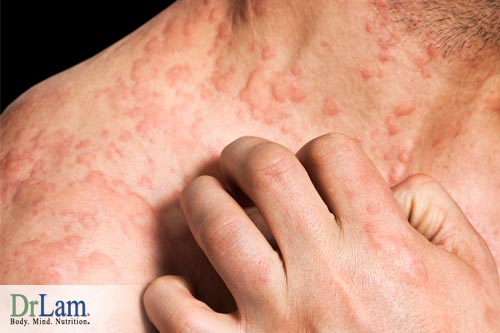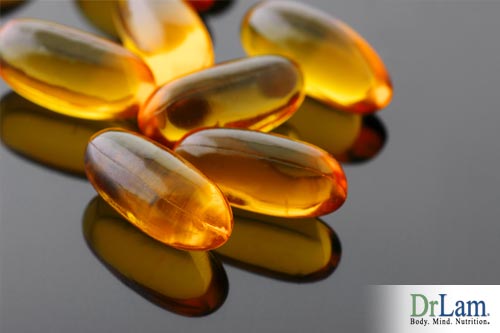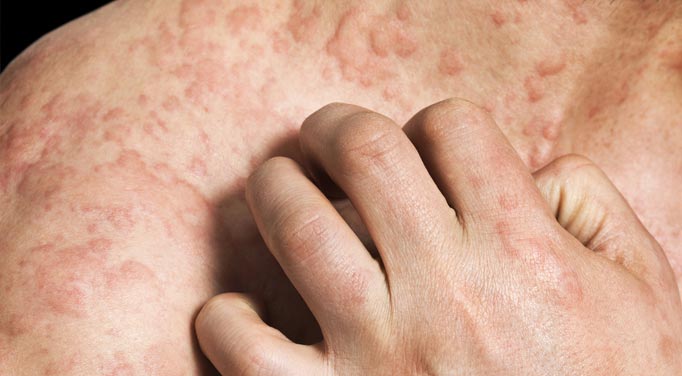 Are supplements such as quercetin for allergies the best choice for you? Allergies come in a variety of forms ranging from the seasonal rhinitis such as hay fever, stuffy nose, itchy and watery eyes, to important illnesses like asthma, eczema, and hives. When the body is not used to and does not welcome certain allergens, an allergic reaction is triggered and immunoglobulins are released. These trigger an inflammatory response and sets up a cascade of cell-mediated reactions where the tissues become swollen with cellular fluids build-up which then causes difficulty in breathing as well as swelling in the affected area. Controlling of the inflammatory response is, therefore, critical in normalization of allergic reaction whether it is airborne or food related. This is where conventional antihistamine medications come into play, but many of us are not aware that there are several natural supplements that can also help tame this response such as quercetin for allergies.
Are supplements such as quercetin for allergies the best choice for you? Allergies come in a variety of forms ranging from the seasonal rhinitis such as hay fever, stuffy nose, itchy and watery eyes, to important illnesses like asthma, eczema, and hives. When the body is not used to and does not welcome certain allergens, an allergic reaction is triggered and immunoglobulins are released. These trigger an inflammatory response and sets up a cascade of cell-mediated reactions where the tissues become swollen with cellular fluids build-up which then causes difficulty in breathing as well as swelling in the affected area. Controlling of the inflammatory response is, therefore, critical in normalization of allergic reaction whether it is airborne or food related. This is where conventional antihistamine medications come into play, but many of us are not aware that there are several natural supplements that can also help tame this response such as quercetin for allergies.
In the case of airborne allergens, the use of an air filter or other systems to clean the air is advisable. Homes that have carpet flooring should be changed to wood flooring. But such changes can be expensive and disruptive. Could an easier option like quercetin for allergies be what you need?
Conventional medicine uses a host of synthetically derived and laboratory made antihistamines to combat the release of histamines in order to reduce the swelling and control symptoms. While this works the majority of the cases if properly dosed, there is a significant number of side effects including sleepiness and dizziness just to name a few. The following natural compounds, including quercetin for allergies, are excellent when it comes to
relieving symptoms of allergies without any side effects:
 Quercetin can be considered the king of the flavonoids. It is an excellent natural anti-histamine. It also interferes with the pain promoting inflammatory substances that are generated in the body in many auto-immune diseases including rheumatoid arthritis and colitis. In addition to its antihistaminic effect, studies have shown that it is also able to fight off an enzyme that neutralizes cortisol, a natural anti-inflammatory chemical produced by the body. You can get quercetin by drinking more unfermented green tea as well as red wine. Apples, onions, tomatoes, green peppers, as well as broccoli are all excellent sources of quercetin. However, as a large amount of it is required to produce a positive effect, it is better to take a supplement of quercetin for allergies. The recommended dose is 600-6000mg in divided dose on an empty stomach.
Quercetin can be considered the king of the flavonoids. It is an excellent natural anti-histamine. It also interferes with the pain promoting inflammatory substances that are generated in the body in many auto-immune diseases including rheumatoid arthritis and colitis. In addition to its antihistaminic effect, studies have shown that it is also able to fight off an enzyme that neutralizes cortisol, a natural anti-inflammatory chemical produced by the body. You can get quercetin by drinking more unfermented green tea as well as red wine. Apples, onions, tomatoes, green peppers, as well as broccoli are all excellent sources of quercetin. However, as a large amount of it is required to produce a positive effect, it is better to take a supplement of quercetin for allergies. The recommended dose is 600-6000mg in divided dose on an empty stomach.
In addition to quercetin for allergies, bromelain is an enzyme that is found in pineapple stems. Its primary activity is to reduce inflammation and promote healing, especially in the muscle and joints. As such, it is quite popular and is used widely in sports medicine and trauma management. Bromelain's anti-inflammatory property also plays a significant role in the management of asthma, arthritis, colitis, and other allergy responses. It should be noted that only high potency and high-quality supplements should be used In a therapeutic setting. Bromelain's potency is rated in terms of GDU units. The higher the GDU number, the more potent it is. The recommended GTU unit should be at least 2500-3500. A dosage of 600-2000mg is required for therapeutic effects. It should be taken on an empty stomach with quercetin.
 Vitamin C is a fundamental nutrient to good health. In particular, in an asthma and allergy setting, vitamin C has been proven effective in combating symptoms of allergies. A dosage of 1000mg or more has some antihistaminic effect, but the Vitamin C does much more than that. Because vitamin C is water-soluble, its action is slower. A few weeks may be needed to achieve the adequate blood level. In the case of asthma, many studies have shown that a daily vitamin C dosage of 1000-2000mg can improve lung function and reduce the chances of asthmatic attacks. In one study, a daily dose of 2 grams has been shown to reduce asthma. Always try to include bioflavonoids when taking vitamin C, especially in high doses. While there is a fair amount of vitamin C in fresh fruits, there is a trade-off in the sense that fruits high in vitamin C are high in sugar and carbohydrates. If you choose to take vitamin C from natural sources, dark green vegetables, red peppers, lemon juice, and totals are smart selections. Cabbage, broccoli, strawberry, and citrus fruits are also acceptable. Try to stay away from the melon family as melons are high in sugar. Taking large amounts of vitamin C is remarkably safe. It is also good to add some digestive enzymes which contribute to a better blood concentration of vitamin C. The body uses vitamin C quickly after it has been injected. It is good to take Vitamin C in divided doses, with no more that 2 grams at any one point in time. Taking vitamin C together with bioflavonoids such as quercetin for allergies will potentiate the effects of vitamin C. In the case of allergic response, always take Vitamin C in conjunction with some quercetin. Therapeutic dosage is anywhere from 2-10g of a complex cocktail consisting of vitamin C, lysine, proline, bioflavonoids, grape seed extracts, and ascorbyl palmitate.
Vitamin C is a fundamental nutrient to good health. In particular, in an asthma and allergy setting, vitamin C has been proven effective in combating symptoms of allergies. A dosage of 1000mg or more has some antihistaminic effect, but the Vitamin C does much more than that. Because vitamin C is water-soluble, its action is slower. A few weeks may be needed to achieve the adequate blood level. In the case of asthma, many studies have shown that a daily vitamin C dosage of 1000-2000mg can improve lung function and reduce the chances of asthmatic attacks. In one study, a daily dose of 2 grams has been shown to reduce asthma. Always try to include bioflavonoids when taking vitamin C, especially in high doses. While there is a fair amount of vitamin C in fresh fruits, there is a trade-off in the sense that fruits high in vitamin C are high in sugar and carbohydrates. If you choose to take vitamin C from natural sources, dark green vegetables, red peppers, lemon juice, and totals are smart selections. Cabbage, broccoli, strawberry, and citrus fruits are also acceptable. Try to stay away from the melon family as melons are high in sugar. Taking large amounts of vitamin C is remarkably safe. It is also good to add some digestive enzymes which contribute to a better blood concentration of vitamin C. The body uses vitamin C quickly after it has been injected. It is good to take Vitamin C in divided doses, with no more that 2 grams at any one point in time. Taking vitamin C together with bioflavonoids such as quercetin for allergies will potentiate the effects of vitamin C. In the case of allergic response, always take Vitamin C in conjunction with some quercetin. Therapeutic dosage is anywhere from 2-10g of a complex cocktail consisting of vitamin C, lysine, proline, bioflavonoids, grape seed extracts, and ascorbyl palmitate.
Pantethine is a derivative of pantothenic acid (Vitamin B5). When inside the body, it is converted into Coenzyme A. coenzyme A is one of the few substances that the body needs in the metabolism of protein, fat, and carbohydrates. It is also the basis for the production of adrenal steroidal hormones which have an anti-inflammatory effect. The use of Pantethine is, therefore, an excellent choice when it comes to conditions such as allergies, asthma, lupus, or psoriasis. Because it helps in the production of cortisol, the body's natural steroid, anybody who is taking prednisone or other steroidal medicine stands to benefit. While it may not be able to replace drugs, there is often a synergistic effect and a number of drugs required may be reduced. Pantethine also allows the adrenal glands to generate more omega-3 fatty acid in the body. Omega-3 fatty acid is well known to have anti-inflammatory properties. Reducing inflammation and inflammatory response is a key recovery pathway in an allergic therapeutic setting.
Essential fatty acids are indispensable as they provide building blocks for the body's numerous eicosanoids. Many of these hormone-like compounds are also called prostaglandins and have tremendous anti-inflammatory power. Omega-3 fatty acid, in particular, is very strong in generating eicosanoids. Most of us living in the modern world already have a high intake of omega-6 fatty acid from a variety of processed foods. Accordingly, we are low in Omega-3. Inflammatory conditions such as arthritis, plaques, blood clots, and immune system weakness are related to a lack of omega-3 fatty acid intake.
Essential fatty acids found in omega 3 fats and oil are alpha-linolenic acid, eicosapentaenoic acid (EPA), docosahexaenoic acid (DHA). The anti-inflammatory properties of omega-3 fatty acid have been well established. In high doses of 3-5 grams or more a day of the active ingredient EPA and DHA, it has been shown that there is a tremendously beneficial effect in inflammatory bile diseases such as colitis and Crohn's disease, autoimmune diseases such as rheumatoid arthritis, and a variety of skin disorders such as eczema and other skin allergies. Because there is a strong inflammatory component in asthma, the use of fish oil in a pulmonary disorder such as asthmatic conditions is an excellent choice.
 As a natural compound, the anti-inflammatory properties of omega-3 fatty acid are excellent. However, doses of up to 10-20 grams may be necessary. It also takes anywhere from 3-6 months for the omega-3 fatty acid blood level to be built up. One note of caution: Most capsules contain approximately 300mg of DHA and EPA combined. In contrast, high-quality fish oil capsules have up to 600mg of combined DHA and EPA. If one were to take in 5 grams of DHA and EPA, then up to 18 capsules of fish oil, depending on potency, may be required. Taking this high number of capsules or soft gel is generally not recommended. The reason is because, during the capsulation and gel process, high heat is employed, which can destroy part of the fish oil properties and lead to a change in the molecular structure of the fish oil. If a person already has an allergic response, the gelatin used in the gel cap as well as the heat changed fish oil may serve as an irritant. When a high dose is contemplated, use only the liquid bottled form. Insist on the purest product which is molecularly distilled and contains less than 5ppb of mercury. When not in use, such fish oil liquid should be stored in an ambered glass bottle and placed in the freezer and this is one test of purity. Pure fish oil of high quality will not freeze when put in the freezer. The freezing cold will stop the oxidative process from reducing the effectiveness of the oil. Fish oil should also be dispensed in silverware, and not onto plastic or styrofoam utensils. Because pure fish oil may melt Styrofoam and plastic, fish oil it should be stored in a glass container only.
As a natural compound, the anti-inflammatory properties of omega-3 fatty acid are excellent. However, doses of up to 10-20 grams may be necessary. It also takes anywhere from 3-6 months for the omega-3 fatty acid blood level to be built up. One note of caution: Most capsules contain approximately 300mg of DHA and EPA combined. In contrast, high-quality fish oil capsules have up to 600mg of combined DHA and EPA. If one were to take in 5 grams of DHA and EPA, then up to 18 capsules of fish oil, depending on potency, may be required. Taking this high number of capsules or soft gel is generally not recommended. The reason is because, during the capsulation and gel process, high heat is employed, which can destroy part of the fish oil properties and lead to a change in the molecular structure of the fish oil. If a person already has an allergic response, the gelatin used in the gel cap as well as the heat changed fish oil may serve as an irritant. When a high dose is contemplated, use only the liquid bottled form. Insist on the purest product which is molecularly distilled and contains less than 5ppb of mercury. When not in use, such fish oil liquid should be stored in an ambered glass bottle and placed in the freezer and this is one test of purity. Pure fish oil of high quality will not freeze when put in the freezer. The freezing cold will stop the oxidative process from reducing the effectiveness of the oil. Fish oil should also be dispensed in silverware, and not onto plastic or styrofoam utensils. Because pure fish oil may melt Styrofoam and plastic, fish oil it should be stored in a glass container only.
In addition to the above and quercetin for allergies, DHEA and pregnenolone are both hormones produced by the body's adrenal glands, and they act as prohormones in the synthesis of cortisol, the body's natural steroid. Taking DHEA and pregnenolone will raise the body's internal cortisol level and give you a sense of well-being as they will also lead to the production other hormones such as progesterone, estrogen, and testosterone. Recommended daily dosage of DHEA is 30-100mg and pregnenolone is 30-100 mg.
There may be other underlying issues that cause you to have itchy or dry skin. Histamine reaction or reoccurring allergies can become a problem for the adrenals because your body is constantly under stress having to deal with the inflammation and histamines bombardments.

